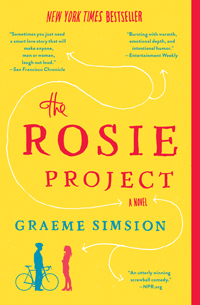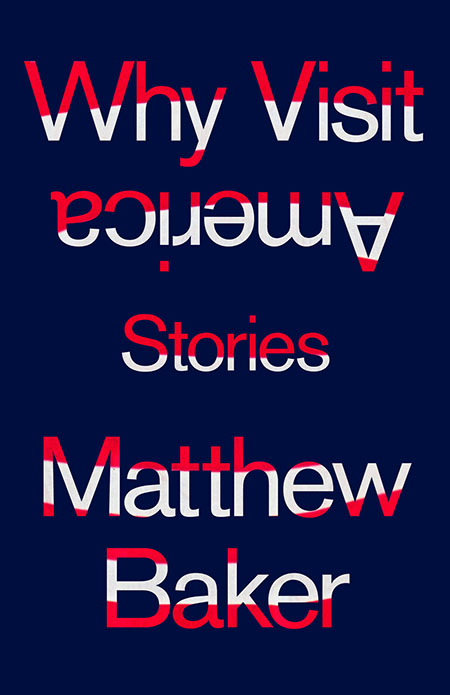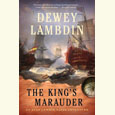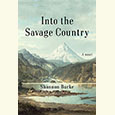Rewired for Love
Now out in paperback, Graeme Simsion’s The Rosie Project is an exuberant romantic comedy
In the first pages of The Rosie Project, Graeme Simsion’s debut novel, Don Tillman, the book’s charmingly awkward protagonist, launches a campaign to find a mate: the “Wife Project” is a plan designed to identify a match by excluding all women who offend his unflagging need for order and consistency.
 A genetics professor in Melbourne on the cusp of turning forty, Don has never been in love. He doesn’t even know if he’s capable of feeling that particular emotion. Nevertheless, he’s confident that his height, physical fitness, intelligence, and income mean he is capable of finding a partner and reproducing “in the animal kingdom.” He’s less confident that the traditional dating paradigm will yield success, however, and has decided to secure a suitable romantic partner through the most logical means. His sixteen-page questionnaire, “a purpose-built, scientifically valid instrument incorporating current best practice to filter out the time wasters, the disorganized, the ice-cream discriminators, the visual-harassment complainers, the crystal gazers, the horoscope readers, the fashion obsessives, the religious fanatics, the vegans, the sports watchers, the creationists, the smokers, the scientifically illiterate, the homeopaths,” is guaranteed to leave him with a short list of potential candidates.
A genetics professor in Melbourne on the cusp of turning forty, Don has never been in love. He doesn’t even know if he’s capable of feeling that particular emotion. Nevertheless, he’s confident that his height, physical fitness, intelligence, and income mean he is capable of finding a partner and reproducing “in the animal kingdom.” He’s less confident that the traditional dating paradigm will yield success, however, and has decided to secure a suitable romantic partner through the most logical means. His sixteen-page questionnaire, “a purpose-built, scientifically valid instrument incorporating current best practice to filter out the time wasters, the disorganized, the ice-cream discriminators, the visual-harassment complainers, the crystal gazers, the horoscope readers, the fashion obsessives, the religious fanatics, the vegans, the sports watchers, the creationists, the smokers, the scientifically illiterate, the homeopaths,” is guaranteed to leave him with a short list of potential candidates.
It’s clear to his friends (all three of them) that Don has Asperger’s Syndrome, but he is blind to his own symptoms, unaware that others perceive his stiffness and adherence to routine as bizarre, even alienating. Don doesn’t know how to empathize or predict the impact of his interpersonal actions, but to readers his quirkiness and dogged loyalty to reason are endearing: his mistakes and, more importantly, his earnest desire to understand others inspire empathy for Don himself.
 As hilarity and mishaps ensue with different women, Don agrees to meet a candidate named Rosie Jarman, the friend of a friend. In Rosie, Don discovers a wild card who fails to meet his most basic priorities. A vegetarian smoker who hates math, Rosie throws Don’s life into chaos from their first meeting. He invites her to dinner only to investigate her further as an odd subject. Rosie, meanwhile, finds Don equally absurd. She laughs at his Standardized Meal System, a nutritionally balanced plan that has assigned a different dinner for each day of the week, and she laughs again when she learns he has designated days for drinking wine. Rosie upends his careful schedule, rearranges furniture to erect a makeshift table on the balcony, drinks more than one of Don’s mini bottles of wine, and changes his clocks. “Time has been redefined,” Don announces. “Previous rules no longer apply.”
As hilarity and mishaps ensue with different women, Don agrees to meet a candidate named Rosie Jarman, the friend of a friend. In Rosie, Don discovers a wild card who fails to meet his most basic priorities. A vegetarian smoker who hates math, Rosie throws Don’s life into chaos from their first meeting. He invites her to dinner only to investigate her further as an odd subject. Rosie, meanwhile, finds Don equally absurd. She laughs at his Standardized Meal System, a nutritionally balanced plan that has assigned a different dinner for each day of the week, and she laughs again when she learns he has designated days for drinking wine. Rosie upends his careful schedule, rearranges furniture to erect a makeshift table on the balcony, drinks more than one of Don’s mini bottles of wine, and changes his clocks. “Time has been redefined,” Don announces. “Previous rules no longer apply.”
Rosie, meanwhile, is on a quest of her own: the search for her biological father. Don soon finds he can’t stop thinking about her, and he assures himself that assisting with the “Father Project” is not the same as breaking his own self-imposed dating rules. Surreptitiously he collects an array of DNA samples from men, risking his job to test them in the university lab without permission. Along the way, he attempts to overhaul his own habits and mannerisms and, without changing who he is, to study and imitate authentic, unexpected connection in the hope of experiencing it himself.
A former IT consultant, Australia-based author Simsion began writing fiction at age fifty. The Rosie Project was awarded the 2012 Victorian Premier’s Literary Award for an Unpublished Manuscript. It has since been printed in forty countries, its film rights optioned by Sony, and a sequel is scheduled to land on shelves in December 2014. When The Rosie Project was published in the U.S. last fall, it received torrential praise, with reviewers celebrating it as “bursting with warmth, emotional depth, and intentional humor” (Entertainment Weekly), “a smart love story that will make anyone, man or woman, laugh out loud” (San Francisco Chronicle), and “an utterly winning screwball comedy” (NPR). With its vital characters and generous, life-affirming humor, The Rosie Project is nothing short of un-put-down-able, compulsively engaging fun.

Sarah Norris holds an M.F.A. in creative nonfiction from Sarah Lawrence College and has reviewed books for The Daily Beast, Christian Science Monitor, San Francisco Chronicle, and Village Voice, among other publications. She lives in Nashville.


